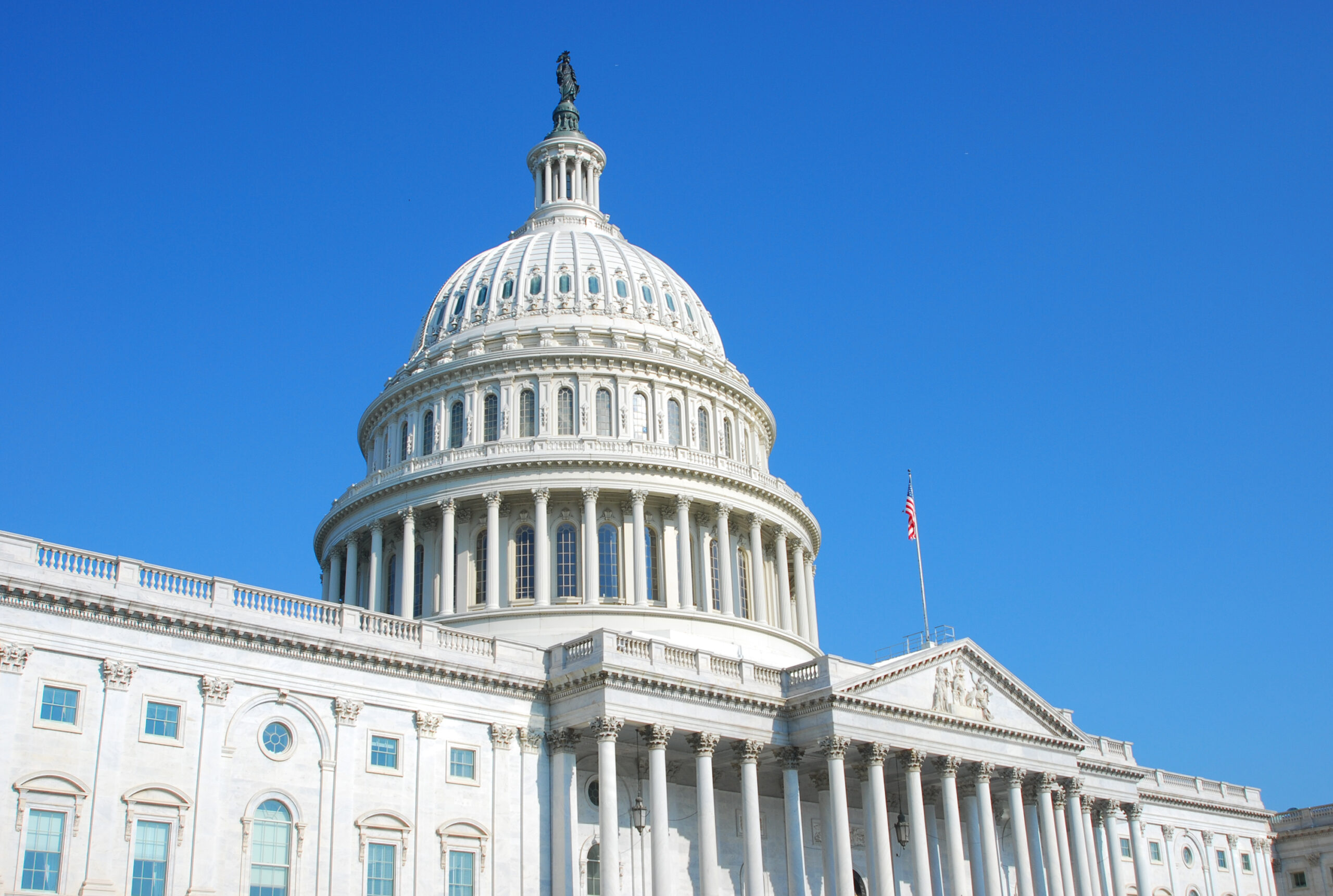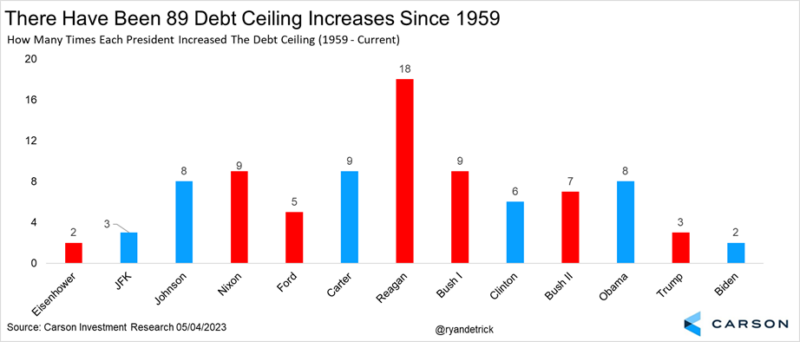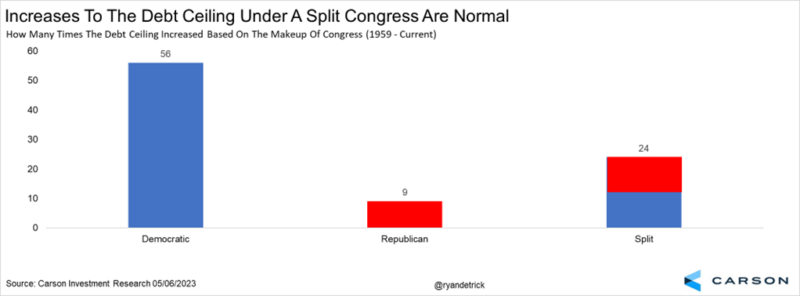“I don’t make jokes. I just watch the government and report the facts.”
– Will Rogers
One of the top questions we’ve received lately has to do with the impending debt ceiling drama and what it could all mean. Here are some common questions and answers regarding this excitement out of Washington.
- What is the debt ceiling? Simply put, it is how much money our country has to pay the bills, authorized by Treasury Secretary Janet Yellen and the Treasury. This is one of those weird ways in which government functions. Congress typically authorizes spending bills, which the President signs into law. Historically, this spending has exceeded government revenues, and Treasury issues debt to cover the deficit. However, there is a “ceiling” to how much total debt Treasury can incur. Congress typically has to pass a second bill authorizing the ceiling to move higher, so that Treasury can pay for spending that was already passed into law. Not raising the debt ceiling is akin to going to a restaurant, ordering and eating the food, and then walking out without paying the bill.

Stay on Top of Market Trends
The Carson Investment Research newsletter offers up-to-date market news, analysis and insights. Subscribe today!
"*" indicates required fields
- What is paid from this? Medicare and Social Security are two of the big ones. But tax refunds, military salaries and interest on national debt are also part of the current $31.4 trillion debt ceiling.
- How common is a debt ceiling increase? Very common is the short answer. The first time it was used was in 1917 to help finance World War I and has happened more than 100 times since. In fact, every President back to Eisenhower has increased the debt ceiling, for a total of 89 times since 1959. President Biden has increased it twice already, which is the least number of times any President has increased it going back 11 Presidents.
- What happens if the current debt ceiling isn’t increased? In theory the U.S. would default on their debt, meaning they’ve run out of money and can’t pay the bills. We do not expect this to happen, and it has only happened once in history, in 1979, but that was more of a clerical error and was fixed rather quickly. Janet Yellen recently said it needs to be increased or such a failure would lead to a “steep economic downturn” in the U.S.
- Who else does it this way? The only two countries who have a debt ceiling and require the Government to vote on it and set the limits are the U.S. and Denmark. That’s it. Nearly all other countries set things as a percentage of their GDP. Why does this U.S. choose to do it this way? This one may be out of my paygrade, but I think it could have something to do with why we like our political theater here in the U.S.
- When will the U.S. run out of money? This is known as the ‘X date’, when the U.S. will run out of money. No one knows this exact day, but Janet Yellen recently said it could be as early as June 1, well before when some of the well-known investment banks were forecasting. Sometime in June seems to be the most widely expected timeframe.
- What options does Congress have? They could do nothing and potentially let the U.S. default, while they could also raise the $31.4 trillion debt ceiling. Another option is Congress can suspend the debt ceiling, something they did seven times since 2013, including as recently as August 2019 to July 2021. President Biden has invited the major members of Congress (Chuck Schumer, Mitch McConnell, Kevin McCarthy, and Hakeem Jefferies) to the White House today (May 9) to discuss and find a resolution.
- What about the makeup of Congress? Speaking of Congress, the debt ceiling has historically been increased whether we’ve had a Democratic, Republican or split Congress. Majority of the time, debt ceilings have been raised when Democrats have full control, though that’s because they were in the power majority of the time since 1959. Specifically, when we have a split Congress (like right now, with a Democratic Senate and Republican House), the debt ceiling has been increased 24 times. So, history says that a split Congress shouldn’t be an impediment to raising the ceiling yet again.
- How likely is a deal? Sonu put together this great SWOT analysis of President Biden and Speaker McCarthy, with some help from Punchbowl News. The Carson Investment Research team’s base case remains that there’s a big disconnect between the two sides right now, but the opportunity is there for some dealing with a final deal before the clock strikes midnight after the final posturing. Ultimately, it’s in neither President Biden’s or Speaker McCarthy’s interest to see a default, and potential economic catastrophe, under their watch.
- What happens if they let the U.S. default? We’d like to stress this is not the base case and we fully expect cooler heads to prevail, but should the U.S. default on its debt (meaning they miss a bond payment to holders of Treasuries) the chances greatly increase of much higher interest rates, a likely recession, and extreme market volatility. Many investors remember back in the summer of 2011 when both sides had trouble agreeing on a new debt ceiling and S&P downgraded the debt on the U.S., causing nearly a 19% decline in the S&P 500 over the following week.
- What do most of the experts think? Most political experts we follow expect the debt ceiling to be increased before X date, making it 90 increases since 1959. This is Washington after all and everyone has an agenda, but we don’t expect the current members of Congress want to be blamed should the U.S. default on its debt, causing a major drop in the stock market and potential recession right ahead of an election year.
So there you have it, 11 things to know about the current debt ceiling drama. We are a long way from a resolution and this will likely be all over the news the coming weeks, but in the end, we think the football will be punted once again.






